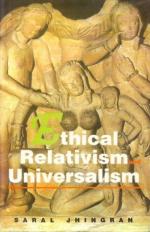|
This section contains 3,396 words (approx. 12 pages at 300 words per page) |

|
The term ethical relativism is always used to designate some ethical principle or some theory about ethical principles, but within this limitation different authors use it quite differently. Contemporary philosophers generally apply the term to some position they disagree with or consider absurd, seldom to their own views; social scientists, however, often classify themselves as relativists. Writers who call themselves relativists always accept the first and second and sometimes accept the third of the theses described as descriptive relativism, metaethical relativism, and normative relativism, respectively.
Descriptive Relativism
The first thesis, without which the others would lose interest, is that the values, or ethical principles, of individuals conflict in a fundamental way ("fundamental" is explained below). A special form of this thesis, called "cultural relativism," is that such ethical disagreements often follow cultural lines. The cultural relativist emphasizes the cultural tradition as a prime source of the...
|
This section contains 3,396 words (approx. 12 pages at 300 words per page) |

|


